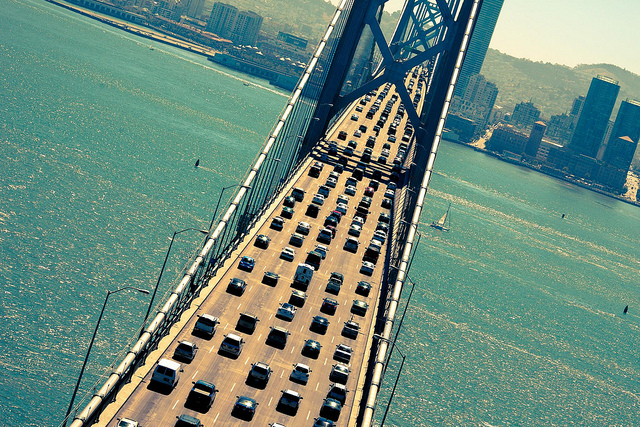American News
Trump’s own tariffs make it harder to rebuild infrastructure

Since Trump announced the tariffs in March, prices have been rising for the American steel used to build bridges, reinforce concrete highways and lay the rails for mass transit systems. (Photo by Thomas Hawk/Flickr, CC BY-NC 2.0)
JEFFERSON CITY, Mo. — President Donald Trump wants to rebuild the nation’s transportation infrastructure. He also wants to strengthen the U.S. steel industry through tariffs on imports.
But that second goal could make it more costly to accomplish the first.
Since Trump announced the tariffs in March, prices have been rising for the American steel used to build bridges, reinforce concrete highways and lay the rails for mass transit systems. Though many of this summer’s big construction projects had locked in pre-tariff prices, concerns are mounting among contractors and some transportation officials that the tariffs could raise costs and delay work that is still in the planning stages.
“The president seems to be at loggerheads with two conflicting priorities of his administration,” said Brian Turmail, vice-president of public affairs and strategic initiatives at the Associated General Contractors of America. “He’s making it very difficult for construction firms and people who build infrastructure to be successful, at least in the short term.”
In Kansas City, for example, voters recently approved higher sales and property taxes to fund a streetcar extension that had been estimated to cost at least $250 million. Though the project had been in the works for a year, officials are now recalculating.
“We are anticipating our prices to increase because of the tariffs,” said Donna Mandelbaum, communications director for the Kansas City Streetcar Authority.
Trump in February announced a $1.5 trillion infrastructure plan that would use $200 billion in federal funds to leverage state, local and private-sector investment. The proposal had yet to gain traction in Congress when the president announced tariffs of 25 per cent on steel and 10 per cent on aluminum imported from most countries. After a temporary exemption, the metal tariffs hit the U.S. allies of Canada, Mexico and the European Union on May 31.
Most federally funded transportation projects in the U.S. already are required by law to use U.S. steel. Tariffs are like taxes charged only on imported products. But because they make foreign steel more expensive, tariffs also allow U.S. steel producers to raise prices without being undercut by international competitors.
The price of U.S. hot-rolled coil steel, a bellwether product for the industry, is up about 40 per cent since the start of this year due to a combination of Trump’s tariffs and strong economic demand, said Joe Innace, the metals content director in the Americas at S&P Global Platts.
Prices also have been rising for specific transportation-related products, such as fabricated metal for bridges.
That’s created a predicament for the owners of a 127-year-old railroad bridge over the Mississippi River at St. Louis that is in danger of being shut down if not replaced soon. Bids for the $219 million Merchants Bridge project were made in February, shortly before Trump announced the tariffs. But in June, the administration denied a grant that would have financed one-third of the project.
Bridge officials now are scrambling to fill the funding gap before a July 7 deadline to decide whether to go forward with the winning bid. Adding to their urgency is the price for the needed 12,500 tons of steel.
“The bidding environment is not going to get better,” said Mike McCarthy, president of the Terminal Railroad Association of St. Louis, which owns the bridge. “In light of steel prices, I think they’re going to be creeping up.”
Some other states also are warily watching steel prices.
California already faces uncertainty because of an attempt to repeal a gas tax hike that’s projected to raise $52 billion for roads and bridges over the next decade. The state Department of Transportation is monitoring whether the steel tariffs will raise material costs “to determine if adjustments may need to be made in future contracts,” agency spokesman Mark Dinger said.
In Pennsylvania, concerns that tariffs could drive up the steel market have officials watching for any effects on their four-year construction plan, said Rich Kirkpatrick, a spokesman for the Pennsylvania Transportation Department.
Rhode Island transportation officials said they are allowing for retroactive cost adjustments in contracts to account for significant changes in steel prices. They have asked the Federal Highway Administration for permission to use federal money to cover those higher costs.
Steel-related products account for about 10 cents of every $1 spent on highways and bridges, though that ratio can be significantly higher for particular projects, said Alison Black, chief economist at the American Road & Transportation Builders Association.
Economic analysts say uncertainty about the duration and impact of the steel tariffs could force some projects to get scaled back or postponed. The ripple effect also could drive up costs for companies that manufacture asphalt pavers, graders and other heavy equipment used in road projects.
Ned Hill, a professor of economic development at Ohio State University, said the situation will “raise havoc.” If construction companies try to bid six months to a year ahead of time, “they aren’t going to know what price to bid on. … And public works departments aren’t going to know how much the project’s going to cost them.”





















